Intel Core i9-9900K Review
Intel Core i9-9900K Review
Is the ultimate gaming CPU worth the money?
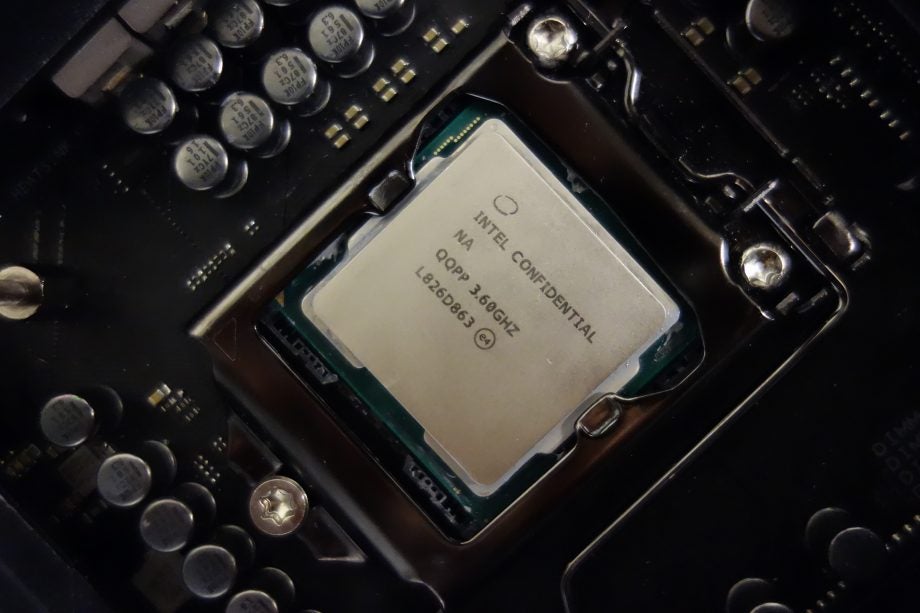
Verdict
The Intel Core i9-9900K is an absolute powerhouse for video rendering and Photoshop at this price. If you're a power-crazy media professional this is the processor to plump for. But for gamers? You can find much better value alternatives.
Pros
- Ultra-speedy for video rendering and editing
- Best clock speeds of all the consumer CPUs
- Price cut sees improved value
Cons
- Not a huge gaming upgrade from previous generation
- Requires powerful cooler to prevent overheating
- Not much room for overclocking
Key Specifications
- Review Price: £484.99
- Eight cores, 16 threads
- 3.60 GHz base clock
- 5 GHz boost clock
- Overclockable
- 14nm manufacturing process
Update #2: We have since tested the new 10th Generation Intel processors. Read our full Intel Core i9-10900K review for the full breakdown.
Update: The Intel Core i9-9900K has seen a massive price cut since its original release, dropping from £600 to as little as £485. Since reviewing the AMD Ryzen 9 3900X, we believe the new price for the Intel chip makes it far more competitive and the best option for premium gaming, and so have adjusted to final verdict score to reflect this.
What is the Intel Core i9-9900K?
The Intel Core i9-9900K is the most powerful CPU in the 9th Generation Intel Core lineup. For casual web browsers and YouTube devotees, this chip is overkill. But for gamers and creatives, Intel claims that this processor will take your performance to the next level.
In fact, Intel even suggests the Intel Core i9-9900K is ‘the world’s best gaming desktop processor’. A bold claim, sure – but with a boost clock speed of 5GHz and the capability to overclock, such a suggestion doesn’t seem so far fetched. Plus, there are a stonking eight cores and 16 threads, giving the Intel 9th Gen i9 a sizable performance boost compared with last year’s offerings.
Sadly, the architecture still hasn’t been lavished with an upgrade. Intel’s been stuck with the 14-nanometre design for four years now, and the Intel 9th Gen processors won’t be ending that rut. On the bright side, that means you get backwards compatibility with the old Z370 chipsets. Although to get the most out of the i9-9900K, you’ll really want to invest in a fully compatible Z390 motherboard instead.
Also launching as part of the Intel 9th Gen processors are the i7-9700K and i5-9600K. Predictably, there’s not much difference between the three CPUs other than shifts in performance power. We haven’t got our hands on the 9th Gen i5 or i7 just yet, but will be sure to call them in for a review to discover the extent they differ from the i9 in performance.
Related: Best Intel processor
Intel 9th Gen CPUs – Technology, specifications and chipset
The Intel 9th Gen processors don’t feature any major architecture changes since their predecessors, but have all seen a bump in performance. This is mainly thanks to the increase in cores and threads.
Both the i9-9900K and the i7-9700K have eight cores, which is a 33% improvement since the previous generation.
With a boosted clock speed of 5GHz, the i9-9900K boasts the best boosted clock speeds of all the Intel Core CPUs, as well as extending its lead over the Ryzen 7 2700X by a sizable margin. Even the new AMD Ryzen 9 3900X can’t quite with the i9-9900K’s clock speeds.
Being overclockable means that, in theory, you can squeeze even more performance power out of the i9-9900K, just in case that 5GHz boosted speed wasn’t already enough.
The 9th Gen Intel Core CPUs also see the return of solder thermal interface materials (STIM). This means that Intel is ditching the thermal paste in favour of soldered metal for its manufacturing process. STIMs offer improved heat dissipation, helping to prevent shutdowns due to soaring temperatures. But as you’ll read later in this review, the i9-9900K is so powerful that even STIM couldn’t quite prevent overheating.
The new wave of Intel chips also showcase some subtler, but very welcome, features. There’s Intel Optane memory support for example, as well as support for Gigabit Wi-Fi speeds.
| Cores | Threads | Base clock speed (GHz) | Boosted clock speed (GHz) | TDP
|
Intel Smart Cache | Price | |
| Intel Core i9-9900K | 8 | 16 | 3.6 | 5.0 | 95W | 16MB | £600 |
| Intel Core i7-9700K | 8 | 8 | 3.6 | 4.9 | 95W | 12MB | £500 |
| Intel Core i5-9600K | 6 | 6 | 3.7 | 4.6 | 95W | 9MB | £350 |
| Ryzen 7 2700X | 8 | 16 | 3.7 | 4.3 | 105W | 20MB | £300 |
| Intel Core i7-8700K | 6 | 12 | 3.7 | 4.7 | 95W | 12MB | £450 |
| Intel Core i5-8600K | 6 | 6 | 3.6 | 4.3 | 95W | 9MB | £290 |
Related: Best AMD Ryzen CPUs
Intel Core i9-9900K – AMD Threadripper 2 competitor?
For our testing process, we compared the Intel Core i9-9900K to the i7-8700K and AMD’s Ryzen 2700X. You might be wondering why we didn’t compare it to the Intel Xeon and AMD Threadripper 2 range.
Our reasoning for excluding the majority of Intel Xeon and AMD Threadripper 2 CPUs is because they have a different target audience, with prices sometimes soaring over the £1000 mark. Unless you’re a media professional like a developer or an animator, and you seriously need such monstrous power, these CPUs are overkill.
The likes of AMD’s Threadripper 2920X is another matter though, costing roughly around the same price as the i9-9900K. Unfortunately I haven’t got the processor in the office to be able to compare it to Intel’s i9-9900K, but as soon as I get one called in, I’ll be sure to update the benchmark results with my findings.
Intel Core i9-9900K – Test setup
During the reveal presentation, Intel called its i9-9900K CPU ‘the world’s best gaming desktop processor’. To determine how credible this claim is, I benchmarked the i9-9900K with some of the most notoriously demanding video games out there.
Of course, it’s not all about gaming, so I also used some benchmarking software to see how this processor fares at creative tasks.
But benchmark numbers mean very little if there’s nothing to compare them with. So I also dug out the Intel Core i7-8700K and AMD’s flagship Ryzen 2700X to see whether Intel’s new CPU truly is a revolutionary world-beater.
Before I get to my findings though, I’ll walk you through our rig, so you know exactly which components I was using:
- Motherboard: Asus Maximus XI Hero (Wi-Fi) for Intel CPUs / Asus ROG Strix X470-F Gaming for AMD CPU
- GPU: Nvidia GeForce RTX 2080 Ti
- RAM: Corsair Vengeance 2666MHz, 16GB DDR4
- Cooler: Corsair Hydro Series H150i PRO RGB 360mm liquid cooler
- PSU: Corsair CX750M
- SSD: Samsung 850 EVO
- OS: Windows 10 Pro 64-bit
Aside from the motherboards, which I had to switch between because of chipset compatibility, I made sure to keep all of the components consistent in order to have a fair test.
Take note that I had to call in the cooler especially for this review. The Corsair Hydro Series H100i PRO liquid cooler simply wasn’t powerful enough to deal with the heat produced by the i9-9900K.
If you want to see how Intel’s i9-9900K compares to the AMD Ryzen 9 3900X, then check out the latter review for all the latest benchmark results.
Related: Best CPU for gaming
Intel Core i9-9900K – Results
Cinebench R15
It was a promising start for the Intel Core i9-9900K as I began our benchmarking tests with Cinebench R15. The multi-thread result came in at 2058cb. That’s a whopping 45% improvement from Intel’s 8th Generation i7-8700K processor. With two extra cores and four additional threads, this performance boost isn’t too surprising.
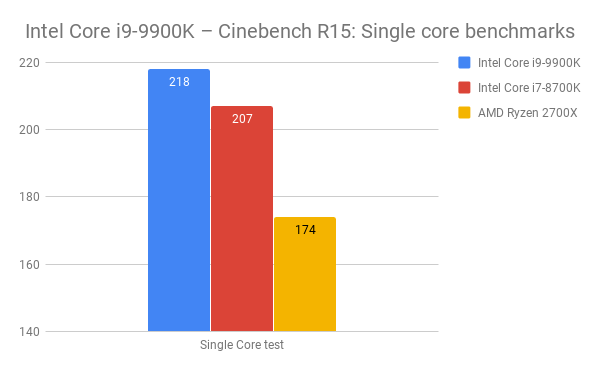
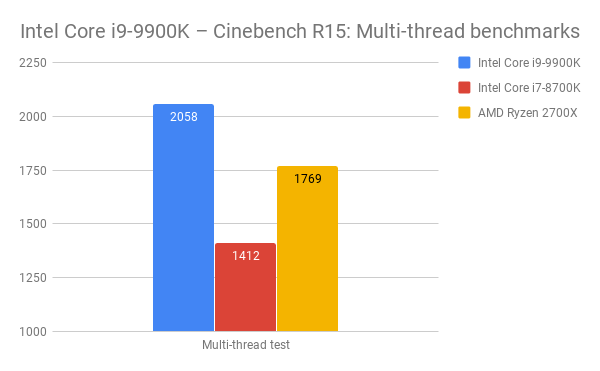
Perhaps what’s more impressive is that the Intel Core i9-9900K boasts a 16% increase on AMD’s Ryzen 2700X for Cinebench’s multi-thread benchmark test. This is despite both the i9-9900K and Ryzen 2700X having 8 cores and 16 threads.
The i9-9900K also saw a slight boost for single-core performance when compared to its predecessor, seeing a score of 218cb. That’s a mere 5% improvement to the i7-8700K. Still, it’s one the best single-core scores I’ve seen when testing processors, comfortably beating the AMD Ryzen 2700X with a 25% difference.
These are very impressive benchmark results for the i9-9900K, proving this CPU to be an absolute dream for those who spends a good chuck of their time on the likes of Photoshop and Premiere Pro.
POV-Ray
Next up, I tested the i9-9900K with the POV-Ray benchmarking software. I saw similar results here, with the 9th Gen i9 processor’s results seeing a 37% boost compared with the i7-8700K.
How did the i9-9900K match up against the Ryzen 2700X in the multi-thread POV-Ray test? Well, once again, Intel came out victorious with a 16% advantage.
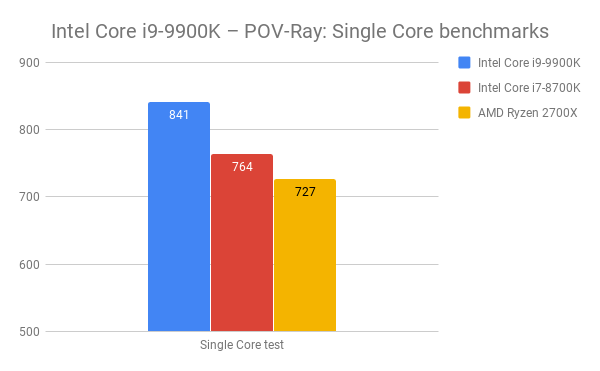
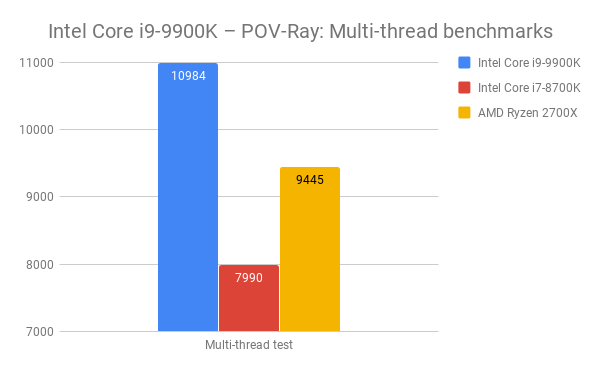
Following these decisive tests, I can conclude that the Intel Core i9-9900K is certainly the most powerful CPU when compared with the Intel Core i7-8700K and AMD Ryzen 2700X. This makes it one of the best consumer processors available for media work. If you want to render 4K video, then this is a fantastic CPU to opt for.
It’s creative chops are well established then, but how does this performance power translate for gaming?
Shadow of the Tomb Raider
After seeing such impressive benchmark results so far, I was expecting the i9-9900K to score significantly better frame rates compared with the i7-8700K, especially since Intel labelled it ‘the world’s best gaming desktop processor’. Sadly, this was not the case. Across the board the difference was minuscule.
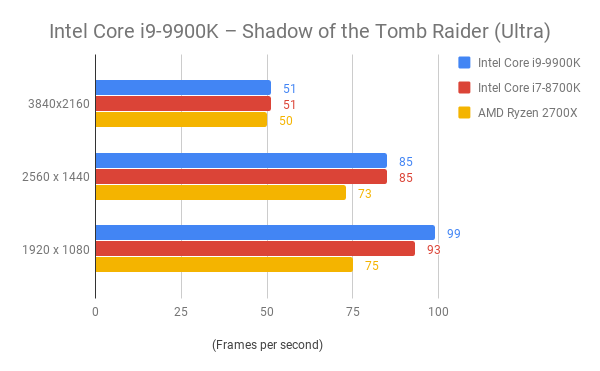
First, I tested Shadow of the Tomb Raider, one of the most power-demanding video games currently available. The frame rates were identical between the two Intel CPUs for all of our benchmarking tests bar Full HD. But even then, it was only an improvement of 7fps – even the fussiest of pixel perfectionists won’t notice the difference when staring at the screen.
Even more alarming, the Ryzen 2700X was behind by only 1fps in the 4K test. Considering AMD’s CPU is (at the time of writing) half the price of the i9-9900K, that’s incredibly disappointing for gamers.
Ghost Recon Wildlands
Unfortunately, I saw similar underwhelming results with Ghost Recon Wildlands. There was hardly a difference between the i9-9900K and the i7-8700K results, with 2fps being the maximum advantage the 9th Gen processor had over its 8th Gen sibling.
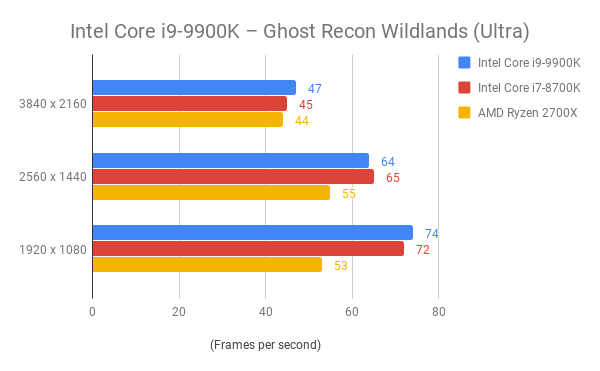
In the 2560 x 1440 benchmark test, the Intel Core i7-8700K narrowly beat the i9-9900K’s score. Obviously, these benchmark scores can vary, so it doesn’t mean the i7-8700K is the superior CPU for gaming. But it does emphasise that there really isn’t much between the two Intel processors.
Again, there was no surprise that the i9-9900K steamed ahead of the Ryzen 2700X for the 2560 x 1440 and Full HD benchmark tests. But alarmingly, there was only a 3fps difference when benchmarking in 4K. If you’re looking to play Ghost Recon Wildlands in Ultra HD, the Ryzen 2700X looks better value than the i9-9900K
Dirt Rally
Since the previous two video games are extremely power-intensive, I thought it would be wise to use a slightly older and more forgiving video game to try and give the i9-9900K some extra freedom to show its muscle. For this reason, I decided to use Dirt Rally for benchmarking.
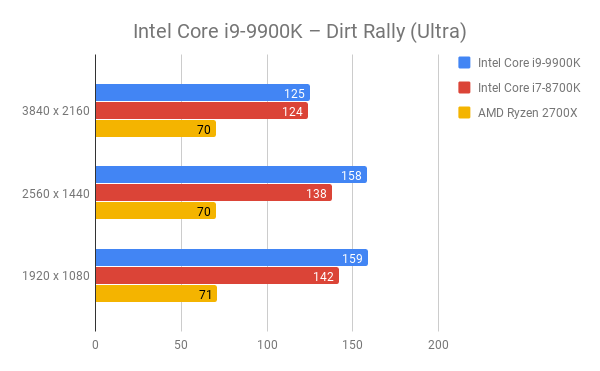
As you can see from the 4K results, it was the same story as before, with just 1fps separating the two Intel processors. However, by cranking down the resolution, I finally saw the i9-9900K take a sizable lead over its 8th-gen sibling.
In the 2560×1440 test, the i9-9900K stole a march of 20fps. That’s a 14% increase, which is pretty impressive for a processor. The problem? At 158fps and 138fps, these frame rates are so high the naked eye probably won’t notice a difference. Even the Ryzen 2700X, which has half the frame rates in this test at 70fps, will look just as impressive at this resolution if your eyes aren’t pressed up against the monitor.
Civilization VI
So far for the gaming benchmarks, I’ve focused solely on frame rates and established the i9-9900K doesn’t really make a significant improvement in this department compared with its rivals. Processors are so powerful these days that they’re no longer the bottleneck for video game frame rates.
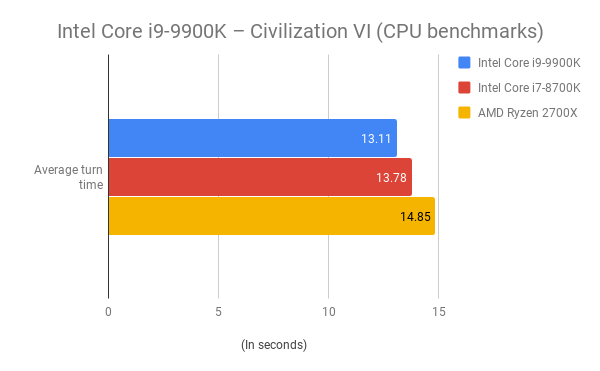
However, the i9-9900K could potentially still have a substantial impact on games that rely on the CPU to make complex calculations. Civilization VI is one such title, as it requires a beefy processor when the AI is working out strategies. A powerful CPU can be the difference between having to wait an absurdly long time or a mere few seconds after every round.
I put the i9-9900K to the Civilization test, which produced an average turn time of 13.11 seconds. What did the i7-8700K score? 13.78 seconds. That’s right, you only just about get half-a-second of improved speeds with the 9th Gen i9 chip. Of course, any improvement is still a positive.
Related: Nvidia RTX 2080 Ti review
Intel Core i9-9900K – Power consumption and heat
The i9-9900K is a very powerful processor, so it’s no surprise then that it has a pretty substantial peak power consumption when under pressure.
While running the Cinebench multi-thread benchmarks, the i9-9900K recorded a peak power consumption of 204.1W. In the same test, the Intel Core i7-8700K saw a figure of 139.9W.
| Idle | Running Cinebench | |
| Intel Core i9-9900K | 59.7W | 204.1W |
| Intel Core i7-8700K | 59.2W | 139.9W |
| AMD Ryzen 2700X | 70.4W | 203.5W |
Compared with the Ryzen 2700X, however, the i9-9900K’s results are really impressive. The Ryzen 2700X recorded a higher idle power consumption, and only undercut the i9-9900K in the Cinebench power consumption test by half a watt.
This means that if you’re already got a PSU that can handle the vigour of modern gaming, you’re unlikely to have the need to buy a replacement. You may need to purchase a more powerful fan though.
Despite Intel reverting back to STIM when manufacturing the i9-9900K, I still found the CPU to be suffering overheating issues in the early stages of my testing.
This isn’t due to any issue in the CPU’s design. It’s simply because the i9-9900K is such behemoth that it needs an ultra-powerful cooler to function.
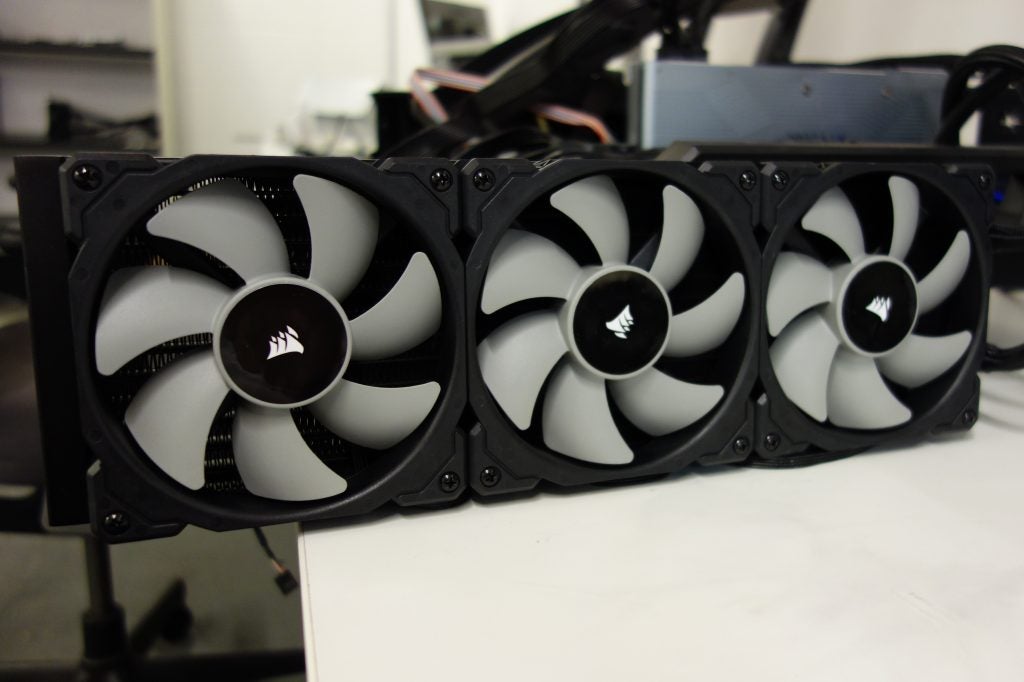
I was forced to upgrade to the Corsair H150i Pro Liquid CPU cooler to prevent the Intel Core i9-9900K from crashing
I was initially using the Corsair H60 liquid cooler for my testing rig. It’s done a fine job previously, whether it was cooling the Intel Core i7-8700K or AMD’s Ryzen 7 2700X. Boot up the rig with the i9-9900K installed though, and the Corsair H60 is helpless in preventing a system crash.
Despite boasting two 140mm fans that can run a max speed of 2400rpm, the Corsair Hydro Series H100i v2 Extreme Performance Liquid CPU Cooler didn’t do a much better job either. It at least prevented further system crashes, but heating issues persisted, restricting the processor from exceeding its base clock speed of 3.60GHz, which consequently affected benchmark results.
After calling in and installing the Corsair H150i Pro Liquid CPU cooler, all heating issues were resolved, proving the i9-9900K wasn’t at fault. That said, it’s still a pain being forced to upgrade your components. You’ll really need to make the most of the boosted performance to get your money’s worth with Intel’s flagship i9 CPU.
Intel Core i9-9900K – Overclocking
With Intel proudly flaunting the fact that overclocking experts have been able to overclock the Intel Core i9-9900K to an astonishing 7.6GHz, you’d assume this processor is hugely overclockable.
However, given the heating issues I experienced with initial testing, I wasn’t feeling confident with the i9-9900K’s overclocking potential. Turns out my concerns were well founded.
As soon as I pushed the i9-9900K past 5GHz, it started to get unstable. Cranking it up to 5.2GHz brought about the blue screen of death. By increasing the voltage up to 1.4V I was able to get the CPU functioning at 5.2GHz, but it became too unstable for me to willingly push on further.
So how were the professional overclockers able to push the i9-9900K so much further? They were using a liquid helium cooler, which isn’t exactly a practical option for general consumers.
Given I was using the very respectable Corsair Hydro Series H150i PRO liquid cooler, it’s unlikely that many users will be able to get much better overclocking results than I did. And considering how unstable things became when I pushed the CPU past 5GHz, I really don’t recommend overclocking the Intel Core i9-9900K.
Why buy the Intel Core i9-9900K?
Intel heralded the i9-9900K as the ‘the world’s best gaming desktop processor’ during launch. That’s a claim that’s difficult to disprove, as the CPU did post slightly better results than the rest of the competition.
Is the i9-9900K the world’s best-value gaming desktop processor though? Probably not. You could buy the i7-8700K for a hundred pound less, which sees similar gaming benchmark results.
That said, by opting for the i7-8700K you’ll lose out on the i9-9900K’s excellent multi-core performance for productivity and media-editing workloads. The boosted multi-core performance will also be beneficial for complex strategy titles such as Civilization and Total War titles.
The Intel Core i9-9900K may not be the absolute best consumer processor for creative tasks – that titles belongs to the AMD Ryzen 9 3900X – but it’s still one of the best options currently available, especially when coupled with the best-in-class gaming performance.
Related: AMD Ryzen 9 3900X Review
Verdict
The Intel Core i9-9900K is the absolute best processor for gaming while also offering a solid performance for creative tasks.


